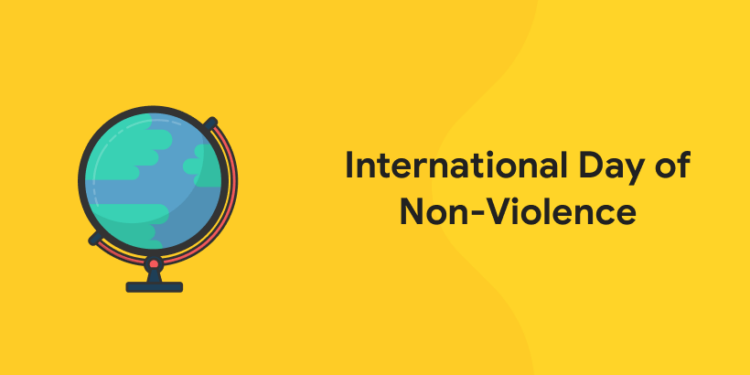Table of Contents
International Day of Non-Violence 2021 : International Day of nonviolence is celebrated annually on October 2nd of 2021. Every year, nonviolence day is celebrated on the birthday of Mahatma Gandhi. The birthday of Mahatma Gandhi is also celebrated as the International Day of Non-Violence. The International day of non-violence is started to be observed by the United Nations (UN). As we all know, the great leader Mahatma Gandhi is considered the epitome of non-violence. He was also a powerful leader of the Indian Independence Movement.
He is regarded as the pioneer and the propagator of the philosophy of Ahimsa which is otherwise called Non-violence. ‘Ahimsa Paramo Dharma’ is one of the famous quotes popularized by Mahatma Gandhi to propagate the idea of nonviolence. Ahimsa is otherwise termed as non-violence. The idea of non-violence is regarded as the highest moral and spiritual virtue than a human being should achieve. It is important to know the significance of the non-violence movement. The International Day of Non-Violence can promote the value and importance of non-violence. This day is a reminder to the world to follow the path of nonviolence and shift from the path of ahimsa.
International Day of Non Violence 2021 Theme
International Day of Non Violence 2021 date is on October 2. The international day of non-violence is celebrated to spread the idea of nonviolence among the people. It orients the people to move through the path of non-violence and to embrace the ideologies connected to the concept of nonviolence. The philosophy of nonviolence should be propagated among a maximum number of people so that the mass can move through the path of non-violence moving away from the darkest paths of violence. It is important to understand that violence is not a solution to any problem. Violence is the worst decision taken by the people to avert a conflict.
The people should be encouraged to turn to the path of non-violence and understand the value of non-violence. The international day of nonviolence encourages the people to spread the value of non-violence through public awareness and education. In 1930 and 1942, the Quit India Movement and Dandi Salt March were organized and led by Mahatma Gandhi. These movements were part of the attempt to erase the concept of untouchability, women oppression and discrimination based on religion, caste, creed and so on. The teachings of Mahatma Gandhi still inspire many people across the globe. The practice of nonviolence can bring peace to the world and the world should follow the path of the non-violence path.
International Day of Non-Violence: History
In 2007, the International Day of Non-Violence was first observed. It is an occasion to spread the message of nonviolence through the proper education and awareness to the people belonging to both the rural and urban areas. UN General Assembly passed a resolution to shed light on the concept of nonviolence. Peace, understanding, empathy and tolerance can be passed on to the generation through the teachings of the great leader. Mahatma Gandhi can also be called the global iconic figure who can inspire millions of people across the world to adopt the path of nonviolence.
Iranian Noble Laureate Shirin Ebadi proposed the concept of the celebration of non-violence in January 2004. Congress leaders were attracted by the concept of non-violence from 2007 onward. Mr Anand Sharma who was India’s Minister of State for External Affairs introduced the great resolution about the concept of nonviolence and Mahatma Gandhi’s ideologies and philosophies were accepted and recognized by the world.
Get the latest current affairs notes here
International Day of Non-Violence: Significance
International Day of Non-Violence is an attempt to pass on the message of peace and nonviolence to ensure the security of the world. Gandhiji was an inspiration and a living model to many people. He paved way for the growth and development of the country. Even though the situations were worse, he remained for the non-violence and paved the way for the development of the country under the worst circumstances. Gandhiji helped to face innumerable challenges.
Concept of Non-Violence
Non-violent resistance is also known as the principle of nonviolence. The nonviolent movement resists the idea of using physical violence to achieve any goal be it political or social. It is important to understand the value of the truth and nonviolence. This is regarded as the politics of the common people or the ordinary man. The social struggle faced by the mass can be eradicated by nonviolent means. Nonviolence can create changes across the globe. The nonviolence action can be categorized into three main branches namely the non-cooperation movement, nonviolent interventions and protests and persuasions including dharnas and marches.















